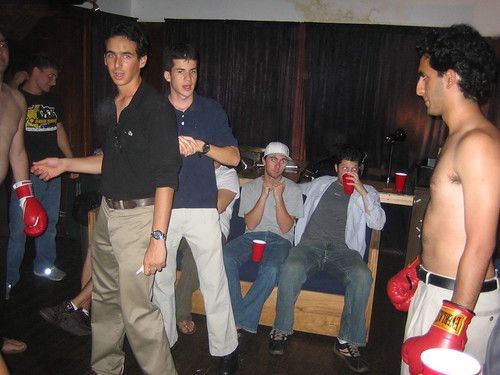
Recent articles about hazing at Dartmouth, as well as the embattled chapters of Jewish Fraternity Alpha Epsilon Pi, left me wondering: why do we give fraternities, as institutions of our peers with little, if any, distinguishable qualities from the rest of the student body, positions of power in our colleges and universities? What makes otherwise respectable young men and women act like fools when thrust into these social situations? And why would anyone endure any form of hazing to be a part of such a club?
I’ve learned more about Greek letters since coming to college than in any science class. Alpha Epsilon Pi, Psi Upsilon, Delta Kappa Epsilon, and Beta Theta Pi all have prominent positions on my campus, not to mention the barrage of symbols encountered when visiting other, bigger schools with highly visible Greek scenes. I have friends, both at Wesleyan and other schools, who are members of Fraternities and Sororities. Most have not, to the best of my knowledge, encountered any form of hazing, particularly in light of highly public incidents in the past few years. I’d like to think I know a decent amount of the public faces of fraternities – a bunch of rowdy students pursuing hedonism and sometimes community services. But as I have been informed, there is another entire layer to what goes on in these organizations that I, and the rest of the public, are not privy to. And that face is sometimes ugly.
But what I still don’t understand is why? What could make a group of nice Jewish boys turn on each other like that? What about brotherhood means you have to beat each other, make pledges get alcohol poisoning, and engage in other risky and disgusting behaviors simply to prove yourself?
It could be the college bubble. Isolated from nearly everyone but your age group, you strive to establish yourself among your peers, most of whom are concerned with their own pursuit of happiness, various causes, and hopefully their studies. To organize college students means to exacerbate the already prominent proclivities towards aggression and substance abuse. To become a member of such an organization, you have to go over the top, engaging in the most outrageous behaviors so that they know that you are worthy.
But that’s just my theory. And I hope that I’m wrong. I hope that the behaviors exhibited at Dartmouth and the shuttered AEPi chapters are anomalous. But if I’m not, perhaps we need to define brotherhood.
